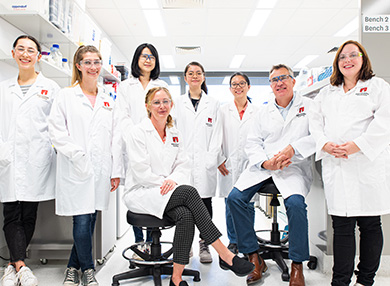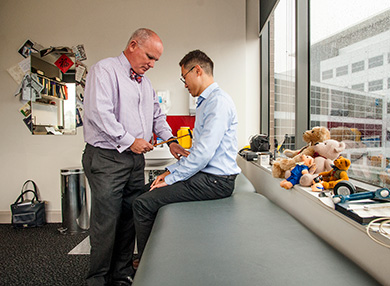Working together to stop Motor Neuron Disease
Macquarie has brought together Australia’s largest concentration of MND researchers and experts in MND clinical care to find the causes of MND, develop therapies to ultimately cure it, and provide patients with world-class care.

Improving the lives of patients with MND
Since its inception in 2013, Macquarie’s Motor Neuron Disease Research Centre has driven the growth of MND research nationally and internationally.
Motor Neuron Disease (MND) has a devastating impact on the Australian community. Two Australians die every day from MND and the rate of the disease has escalated in recent decades. Unfortunately, there is currently no cure for MND. The way in which the disease manifests and progresses causes much distress for families and friends.
The Macquarie University Motor Neuron Disease Research Centre is home to more than 90 researchers working across nine integrated biomedical research programs. Each program contributes to the Centre’s goals of advancing understanding of the origins of MND, developing more effective diagnostic tools and treatments for the disease, and ultimately one day ridding the world of MND.
The MQ Health MND Service links this research with clinical care to provide the very best management for people living with the disease.
Patients crucial to MND research
While receiving this high-quality care, patients of the MND Service play a crucial role in the fight against MND. Patients, along with their families and supporters, have strongly supported Macquarie’s longitudinal Neurodegenerative Disease Biobank for MND through their generous donations of biological samples such as blood, urine, hair and skin.
The Biobank is Australia's largest, and one of the largest in the world with more than 50,000 samples. It is pivotal to the research taking place across all nine programs of the Macquarie MND Research Centre.
Foundational gene discovery research
Motor Neuron Disease occurs in two forms – genetic and sporadic. About 10 per cent of patients have the genetic or familial form, which means that their MND is caused by inherited gene mutations. Genes also potentially contribute to the onset of sporadic MND, along with environmental and lifestyle risk factors.
 Worldwide, scientists have identified 35 genes thought to cause familial MND.
Worldwide, scientists have identified 35 genes thought to cause familial MND.
Within Macquarie’s MND Research Centre, Professor Ian Blair’s Genetics and Genomics team have been involved in many of the major MND genetic advances to date. The team is investigating the genetic factors that account for the variability in MND. They are also working to identify the gene variations that put people at risk of developing sporadic MND.
Expanding therapeutic discoveries and clinical trials
This gene discovery research is laying the foundation for a growing number of therapeutic discoveries. The Macquarie MND Research Centre is at the forefront of this work.
 In recent years, the Centre has increased its focus on developing and testing new therapeutic strategies – treatments that have the potential to delay the progression of MND and maximise patients’ length and quality of life.
In recent years, the Centre has increased its focus on developing and testing new therapeutic strategies – treatments that have the potential to delay the progression of MND and maximise patients’ length and quality of life.
Currently, the Centre is working on several ongoing clinical trials.
The 3K3A-APC clinical trial, begun in late 2021, represents a significant feat: a Macquarie designed and executed trial. Under the direction of Professor Dominic Rowe, this study aims to determine if treatment with the engineered protein ‘3K3A-APC’ can help slow the course of MND. The naturally occurring version of the APC protein has been shown to have the potential to produce this benefit, but has too many serious side effects. Firies Climb for MND have funded the study and the Macquarie clinical trials team is working in partnership with ZZ Biotech.
Macquarie is also a key participant in two breakthrough international clinical trials of genetic therapies for people with familial MND: the Atlas and WAVE studies. Both trials also commenced in late 2021.
None of these potentially far-reaching trials would be possible without the dedicated participation of the patients from MQ Health’s MND Service.
Multidisciplinary patient-centric clinical care
The MND Service’s multidisciplinary team of specialists has been providing comprehensive, evidence-based diagnosis and management of all stages of MND since 2010.
The team treats approximately 10 per cent of all Australians living with MND – more than any other site in the country. Importantly, patients bear very little of the cost of their treatment as Macquarie’s donors cover almost all non-rebatable expenses.
 People living with MND have multiple, complex needs. The integrated services offered by Macquarie’s MND Service mean that patients can consult with several expert clinicians in a single session.
People living with MND have multiple, complex needs. The integrated services offered by Macquarie’s MND Service mean that patients can consult with several expert clinicians in a single session.
This includes having access to a genetic counsellor – a unique service in Australia. Informed by the latest genetics research, the team’s genetic counsellors work with both MND patients and their family members, including individuals at risk of having inherited MND.
Analyses of the outcomes for MND patients across Australia have shown that this robust, multidisciplinary model improves the quality of healthcare received by MND patients and results in a statistically significant increase in the length of a patient’s life. For a terminal illness without a cure, these outcomes make a significant difference for people living with MND and their loved ones.
Level 1, 75 Talavera Road
Macquarie University NSW 2109